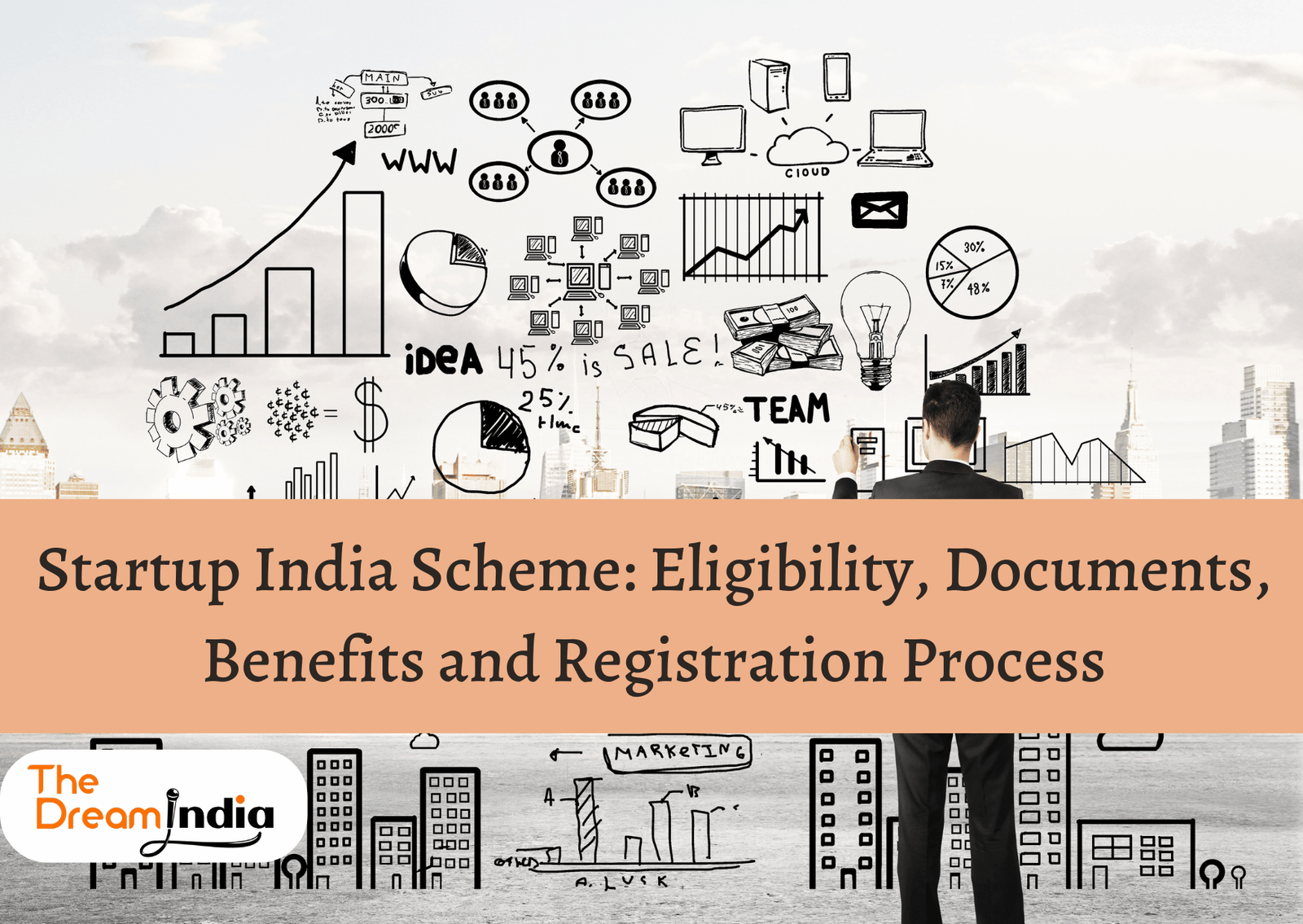
Startup India Scheme is a scheme launched by the Government of India in 2016 to create opportunities for new businesses and help them grow.
It provides different forms of facility for the progress and endurance of enterprises from the beginning stage to create a favorable environment for emerging businesses.
The Startup India scheme eligibility criteria is that the person must be over the age of 18 years. It includes key factors like the entity’s legal structure, age, turnover, and innovative nature of the product or service.
The Startup India Scheme documents refer to different documents that the startups need to submit during registration. It includes the set of papers that represent among others a confirmation that your business is registered, a document detailing how you are going to run it.
The Startup India Scheme benefits include various incentives, support mechanisms, and facilitation measures offered by the government to recognize startups under the scheme. It also includes tax exemptions, easier compliance norms, access to funds and incubation facilities, intellectual property rights (IPR) support, and participation in government tenders and events.
The Startup India Scheme registration process refers to the steps and procedures that startups must follow to apply for recognition under the scheme. This registration process involves creating an account on the Startup India online portal, providing required information and documents, self-certifying eligibility conditions, and undergoing verification by the nodal agency responsible for granting recognition.
Read on to learn more about the Startup India Scheme, the documents required for recognition, the benefits of the scheme, and the steps to register the startup.
What is the Startup India Scheme?

The Startup India Scheme is an initiative launched by the Government of India to promote entrepreneurship and nurture startups in the country in 2016.
The scheme is designed to build a startup to thrive and prosper by offering them different advantages, incentives, and support mechanisms.
This scheme is one of the initiatives formed by the government to promote new ideas, create jobs for people, and grow the economy. It provides tax refunds, compliance simplicity, fund access, and incubation centers while reinforcing industry-academic collaborations.
An article titled “Startup Registration India – 7 Steps to Register your Startup,” written by Mayashree Acharya and published on ClearTax, discusses obtaining official recognition under the Startup India initiative. The article highlights that to provide funding support, the Government has set up a Startup India Seed Fund Scheme (SISFS) on 21.01.2021 with an outlay of Rs.945 crore to provide financial assistance to startups in the next 4 years.
What is the definition of a startup as per Government schemes?
As per government schemes, startups are established and incorporated in India with an annual turnover of not more than a hundred crore rupees for any of the preceding financial years and are engaged in developing products or services.
The definition states the startup should be less than 10 years old from the date of incorporation or registration. Also, it is best if you focus on creating new and original solutions or processes based on technology or intellectual capital.
This definition helps distinguish those qualified startups that could use different government schemes and programs.
According to the Government’s official Startup India website, India ranked 3rd in terms of startup ecosystems; anticipating a Year-over-year growth ranging from 12-15%. In 2018 alone, India had about 50,000 startups comprising 8,900-9,300 tech-led startups, going all the way to show that 1,300 other fresh tech startups rose in 2019 hinting on average 2-3 tech startups being registered every day.
What is the Eligibility Criteria for Startup India Registration?
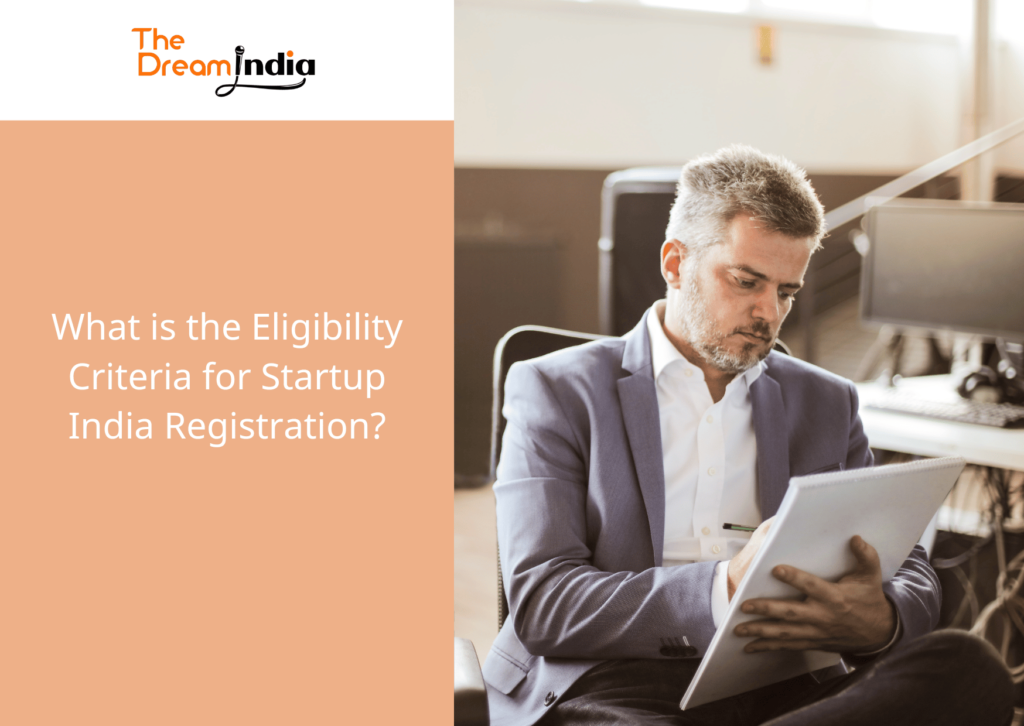
The eligibility criteria for Startup India registration are listed below.
- Age of the Startup: To register for Startup India, a person must be above the age of 18 years.
- Type of Entity: The company can choose between three types of entity before incorporating the business – the Partnership Firm, the Private Limited Company, or the Limited Liability Partnership.
- Annual Turnover: The company’s annual turnover did not exceed Rs.100 crore in any of the financial years since incorporation.
- Entity: The promotors ensure that when starting an organization, they form it themselves, not by breaking away or reconstructing a current operating entity.
- Innovative & Scalable: A modern start-up needs a path to improve its plans for a product, service, or procedure and possesses a growth-oriented business model that promises to bring riches and create jobs.
- Registration and Approvals: The Department for Promotion of Industry and Internal Trade (DPIIT) requires startups to get their approval by getting a recommendation letter from an incubator linked to a post-graduation institution or ratified by the central government. Companies that provide opening capital and equity finances are supposed to be certified or approved by the SEBI. The government funding letter is also needed from the local or central government aiming to promote the invention.
- Partnership Share: For partnership startups, 51% of the shares should be owned by a woman or individuals in the Scheduled Caste and Scheduled Tribe categories. There will be no default on any credit payment they make.
What are the Documents Required For Start Up India Online Registration?
The documents required for Startup India online registration are proof of incorporation, a brief business plan/concept note, and patent details.

The documents required for Startup India online registration are listed below.
- Incorporation Certificate
- Proof of Ownership
- Brief Business Plan
- Patent Details (if applicable)
- Proof of Innovative Nature
- Valid Identity Proof and Address Proof
What Are the Benefits of Startup India Registration?
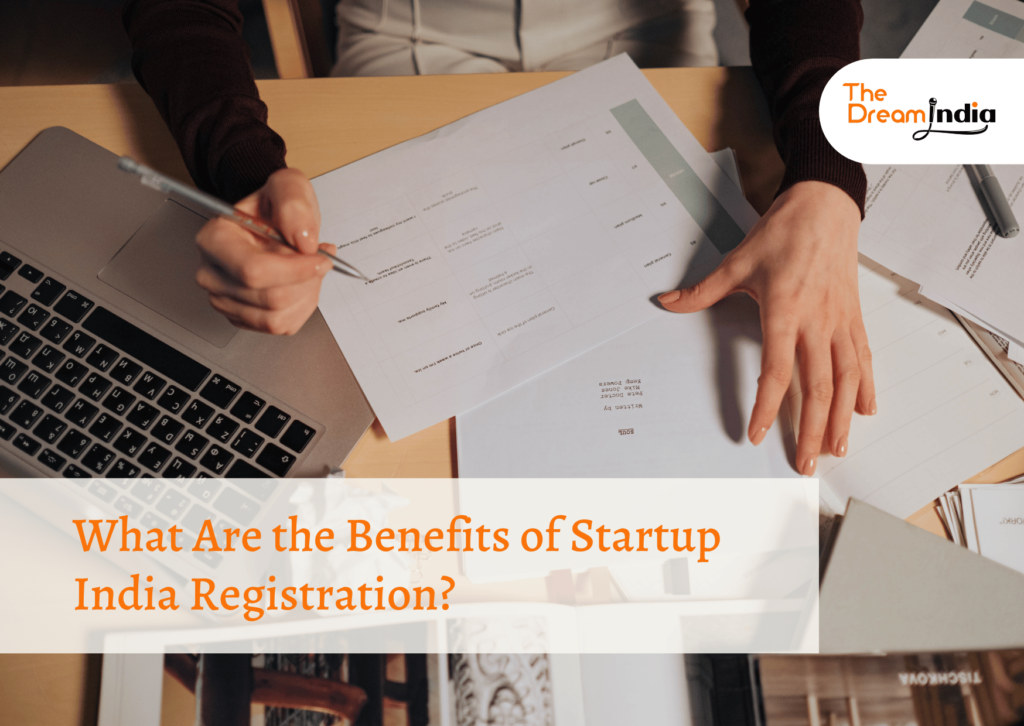
The benefits of Startup India registration include tax exemptions, easier compliance, access to funds and incubators, Intellectual Property Rights (IPR) support, and participation in government tenders and events.
The key benefits of Startup India registration is listed below.
- Tax Exemptions: Certain conditions have to be met by startups in order for them to enjoy a tax-free period of three years on any profits.
- Self-Certification: Startups are allowed to self-certify themselves to comply with labor laws and environmental laws.
- Funding and Incubation Support: Startups can participate in different government plans as well as take advantage of incubators as a way to raise money
- IPR Support: Startups can receive legal support and fast-track patent application processing through IPR support.
- Faster Exit: Investors can easily exit by liquidating assets, which can lead to their benefit from start-ups.
- Access to Networks: Government-supported networks enable startups to reach investors, mentors, and industry leaders.
- Relaxed Norms: The relaxed norms allow startups to get benefit from extensive concessions regarding public procurement, labor laws, and other regulatory requirements.
The objectives of these benefits are to ensure that startups will grow and make innovations and help in the development of the Indian economy by employment facilitation.
An article titled “Startup India Scheme, Benefits, Registration Process” published on FlexiLoans, discusses the various aspects of the Startup India initiative, including its benefits and registration process. The article highlights that one of the key advantages of the scheme is the financial support provided to startups in various forms.
What is the Process of Getting Registration Under Startup India?
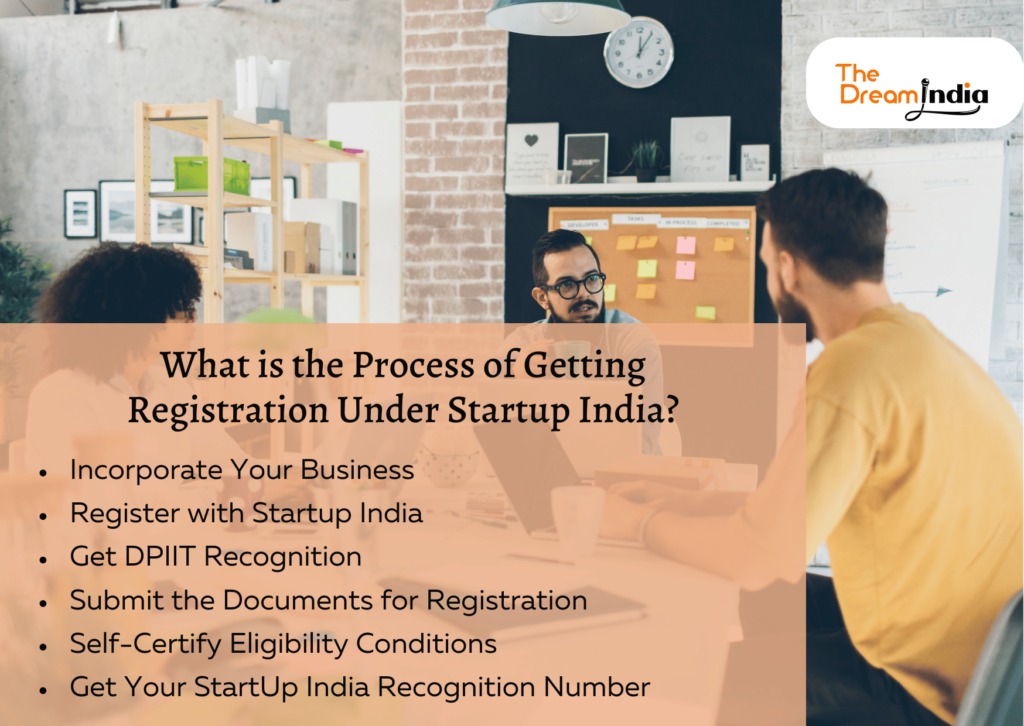
The process of getting registration under Startup India is listed below.
- Incorporate Your Business
- Register with Startup India
- Get DPIIT Recognition
- Submit the Documents for Registration
- Self-Certify Eligibility Conditions
- Get Your StartUp India Recognition Number
1. Incorporate Your Business
Incorporating your business means creating a business entity such as a private limited company, Limited Liability Partnership (LLP), or One-Person Company (OPC) in the eyes of the law through registration with relevant government bodies and getting a valid incorporation certificate.
The initial step is to form a Private Limited Company, Partnership firm or Limited Liability Partnership before starting your business.
Register for business just like any other type of business where you will be required to submit an application for registration and get a Certificate of Incorporation/Partnership registration as part of the process.
An application for the registration of a partnership firm can be submitted to the registrar of firms in a particular area where you want to set up your business. Then, Submit the needed documents, fees, plus an application form to the Company Registrar or Firm Registrar.
2. Register with Startup India
Register with Startup India means the founders formally register their new business organizations with the Indian government through Startup India.
The procedure is very easy, and you can do it online. Go through Startup India’s site and press on the ‘Register’ option, which is visible on the website. Enter your name, email ID, mobile number, and password, and click the ‘Register’ button.
The next step is to enter the OTP that is forwarded to your email and all other details, such as type of user, name as well as the level of the startup, amongst others, before pressing the ‘Submit’ button; all these will result in your Startup India profile being set up.
Once the profile is created on the website, startups can apply for various acceleration and incubator/mentorship programs on the website, along with getting access to learning resources, government schemes, funding options, and market access.
3. Get DPIIT Recognition

The Department of Promotion of Industry and Internal Trade (DPIIT) is a type of identification provided by the Indian government to eligible startups.
After creating a profile on the Startup India Website, the next move is to get recognized by the Department for Promotion of Industry and Internal Trade (DPIIT). This recognition helps the startups to avail benefits like access to high-quality intellectual property services and resources, relaxation in public procurement norms, self-certification under labor and environment laws, access to Fund of Funds, tax exemption for 3 consecutive years, and tax exemption on investment above fair market value.
To get DPIIT Recognition, log in with your registered profile (account) credentials on the Startup India website.
4. Submit the Documents for Registration
Submitting the Documents for Registration refers to providing the documentation required to complete a formal registration.
The documents required for Startup India registration include the incorporation certificate and proof of ownership.
A brief business plan outlining the startup’s product/service, target market, revenue model, and any patent details if the startup has filed or obtained a patent.
These documents help the DPIIT assess the startup’s eligibility, innovative nature, and growth potential.
5. Self-Certify Eligibility Conditions
Self-Certify Eligibility Conditions refer to the process where an entity or individual person meets specific criteria or standards set forth by a regulatory body or organization.
The self-certification process involves the startup declaring that it complies with the prescribed criteria set by the DPIIT.
These criteria include being a private limited company, LLP, or OPC, having a valid incorporation certificate, being less than 10 years old, having an innovative business model or product/service, and operating in an eligible sector.
The startup must self-certify its eligibility on the Startup India portal, and any false declaration may lead to cancellation of recognition or legal action.
6. Get Your StartUp India Recognition Number

The Startup India recognition number is a vital identifier that allows startups to access various benefits and incentives offered under the scheme to formally recognized startups.
Upon successful verification and approval, the DPIIT issues a unique Startup India recognition number to the startup.
These benefits include tax exemptions, easier compliance norms, access to funds and incubation facilities, and participation in government tenders and events.
How many days does it take to get a Startup India certificate?

Usually, it takes around 2 working days to get a Startup India certificate once the application is submitted successfully with the required documents.
To get the Startup India certificate, you will apply online with some supporting documents like proof of corporation which includes patent information where it’s relevant, in addition to a concise business scheme.
Once the application is submitted, it undergoes scrutiny by the DPIIT. If the startup meets the eligibility criteria, the DPIIT issues the Startup India recognition certificate, which usually takes 4-6 weeks from the date of application submission.
Can a one-person company register for Startup India?
Yes, a one-person company can register for Startup India.
Private limited companies, Limited Liability Partnerships (LLPs), and One Person Companies (OPCs) incorporated in India can participate in the Startup India initiative.
A one-person Company that is eligible can apply for Startup India and obtain various benefits following the associated regulations. Eligibility criteria include being a private limited business that is less than 10 years old and has a valid incorporation certificate.
An article titled” The Startup Scene in India: What’s Working and What’s Not“ published on Linkedin, “Not all of the startups in India are successful. Some become successful quickly, while others are struggling to exist. It is reported that 10-15% of Indian startups are successful.”
What is the validity of startup registration in India?
The validity of startup registration in India is that the recognition certificate will be valid for 10 years from when the startup was registered.
The startup is no longer eligible to get benefits or incentives under the Startup India scheme after 10 years.
A startup has been issued a patent during this period so the validity may extended until the patent is granted or until the startup’s turnover exceeds ₹100 crores, whichever is earlier.
Who cannot register under the Startup India scheme?
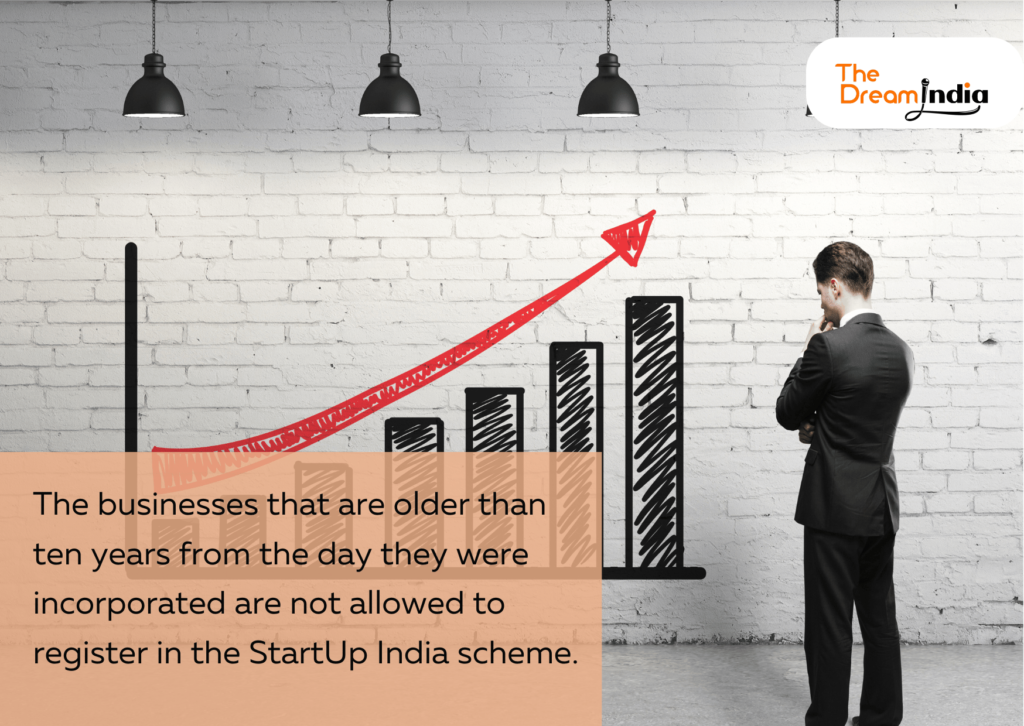
The businesses that are older than ten years from the day they were incorporated are not allowed to register in the StartUp India scheme.
Also, the incorporated entities are not eligible as they should have been either a Partnership Firm, a Private Limited Company, or a Limited Liability Partnership (LLP).
The startups that do not have a plan on how innovation, development as well as improvement of products, processes, or services are done, lack scalability in their models which makes them unsuitable for inclusion in this program.
Is Startup India a success?
Yes, Startup India is a success as it has successfully encouraged and supported new startup companies in the country.
The Scheme has increased awareness and respect for startups, made rules and processes easier to follow, and provided funding help through schemes.
Does Startup India Boost Entrepreneurship?
Yes, Startup India boosts entrepreneurship in India. Entrepreneurship as a career path has become more desirable and respected. It has made it easier for those who want to start and operate businesses.
The Startup India scheme provides several incentives such as tax relief and funding possibilities, like mentorship programs, to encourage more people to become entrepreneurs.
What does it mean by a startup business model?
A startup’s business model means how the startup will work and earn money while considering the costs involved. It is an organized method that helps generate, distribute, and retain value: investors, customers, and talent need a startup business model.





